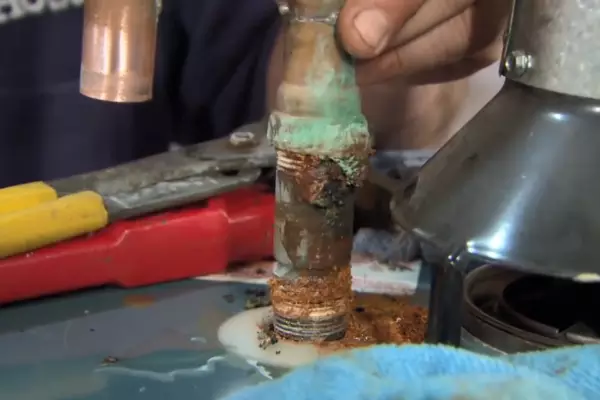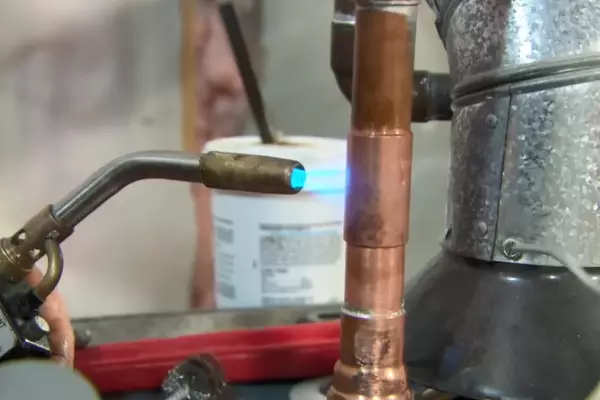Corrosion of water heater pipes is a common problem faced by many homeowners. It not only hampers the efficiency of your water heating system but also can lead to expensive repairs if not addressed promptly. Water heaters play a vital role in our daily lives, providing hot water for showers, cooking, and cleaning.
When it comes to corrosion on water heater pipes, it’s essential to know that it is often the result of various factors. The interaction of metallic pipes with water, specifically hot water, can lead to corrosion over time. Moreover, chemical reactions induced by high pressure and temperature also contribute to this common yet menacing problem.
Home maintenance involves more than cleaning and dusting. Ensuring the functionality of your appliances, like your water heater, is also essential. Paying attention to early signs of pipe corrosion can save you from future headaches, extending the life of your water heater and ensuring it functions optimally.
Contents
Causes of Corrosion
Corrosion on water heater pipes is not an overnight process. It happens over time and is often the result of a combination of factors.
High Temperature and Pressure
Water heaters function under high temperature and pressure, conditions conducive to the corrosion process. The heat and pressure facilitate the oxidation process, leading to the gradual corrosion of pipes.

Chemical Reactions
The water running through the pipes can often contain various minerals and chemicals. Their reaction with the pipe material, under the influence of heat, leads to corrosion. It’s a slow process, but it ultimately degrades the pipe’s quality, impacting the water heater’s performance.
Oxygen and Metallic Interaction
When oxygen comes into contact with the metallic pipes, an oxidation process starts. This process eventually leads to corrosion, damaging the pipes and hindering the water heater’s functionality.
Identifying Corrosion
Recognizing the signs of corrosion early can help to prevent the condition from worsening and causing serious damage to your water heater. A vigilant homeowner can save significant repair or replacement costs by paying attention to the early signs of pipe corrosion.
Corrosion Signs
Visible rust on the pipes or around the connections of the water heater is a classic sign of corrosion. The rust appears as brown or orange discoloration and can feel rough to the touch. But not all signs of corrosion are so obvious. For instance, you might notice a change in the taste or color of your hot water.
If the water starts to have a metallic taste or shows a reddish-brown color, it might be due to rust in the pipes. Also, a drop in the water pressure could indicate a blockage in the pipe due to rust build-up.
Effect on Water Heater Performance
Corrosion can drastically affect the performance of your water heater. A corroded pipe can result in water leaks, leading to wasted energy and higher utility bills. Over time, these leaks can also cause water damage to your property.
If left untreated, corrosion can make your water heater less efficient, leading to lukewarm water, inconsistent heating, or even complete system failure.
Corrosion on Water Heater Connections
The connections on your water heater are critical junctures where corrosion can start due to their constant exposure to water and moisture.
Causes and Signs
The main cause of corrosion at the connections is their constant contact with water. Factors like the water’s pH, temperature, and chemical composition can accelerate the corrosion process.
Signs of corrosion at these connections can include visible rust, leakages, or a buildup of greenish-blue sediment (in case of copper pipes), indicating that the metal is deteriorating.
Impact on Water Heater Lifespan
Corrosion on the connections can significantly impact the lifespan of your water heater. If not addressed in time, it can cause leakages and structural damage that might warrant a complete replacement of the unit.

What Causes Corrosion on Hot Water Heater Pipes
Hot water can accelerate the corrosion process due to its ability to speed up chemical reactions and dissolve minerals.
Role of Hot Water
Hot water can carry more dissolved oxygen than cold water, which can accelerate the oxidation process leading to corrosion. Additionally, hot water speeds up the chemical reactions between the pipe material and any corrosive elements in the water, thus accelerating corrosion.
Minerals and Hard Water Issues
If you live in an area with hard water, your water heater pipes are at a higher risk of corrosion. Hard water is rich in minerals such as calcium and magnesium.
When these minerals come into contact with the pipe walls at high temperatures, they can form deposits known as scales. These scales can trap water against the pipe surface, creating an environment conducive to corrosion.
Tools Needed for Corrosion Removal
Removing corrosion from water heater pipes is a hands-on task that requires the use of specific tools.
Safety Gear
Before starting, make sure to equip yourself with safety gear. This includes safety goggles to protect your eyes from any dust or debris, gloves to protect your hands while handling rough or sharp materials, and a dust mask to prevent the inhalation of harmful particles.
Essential Equipment
You’ll need a few basic tools to remove corrosion from your water heater pipes. These include:
- Wire brush: This is useful for scraping off the rust from the surface of the pipes.
- Sandpaper: After using the wire brush, sandpaper can be used to smooth out the surface and remove any residual rust.
- Corrosion inhibitor: After cleaning, a corrosion inhibitor can be applied to the pipes to prevent future corrosion.

How to Remove Corrosion
The process of removing corrosion requires some basic knowledge and careful attention to ensure safety and effectiveness.
Steps to Safety
Before you start, ensure your safety and prevent any unnecessary accidents. Turn off the power supply to the water heater and shut off the water supply.
Once this is done, open a hot water faucet somewhere in your house to relieve pressure in the heater, and then drain the water heater using the drain valve. Don’t forget to wear your safety gear to protect yourself from any possible harm during the process.
Corrosion Removal Techniques
- Start by scraping off the visible rust from the pipes and connections using a wire brush. Make sure to reach all areas, including corners and hard-to-reach spots.
- Once the rust has been scraped off, use sandpaper to smooth the surface and remove any residual rust. The goal here is to get down to the original metal surface, free from any rust or debris.
- After you have thoroughly cleaned the pipes, rinse them with clean water and let them dry.
- Finally, apply a corrosion inhibitor to the cleaned surfaces. This step is crucial as it will help to prevent future corrosion.
Prevention Measures
Preventing corrosion from starting in the first place can save you a lot of hassle and money in the long run. Here are some preventive measures that you can take:
Regular Inspections
Regularly inspect your water heater, paying special attention to the pipes and connections. Look for any signs of rust or leaks. Detecting and treating corrosion early can prevent more severe damage and expensive repairs later on.
Correct Installation Procedures
When installing your water heater, make sure that it’s done correctly. Incorrect installation can lead to problems like pipe leaks and corrosion. For example, copper and steel are two metals that are commonly used in water heaters.
If they come into direct contact, a reaction known as galvanic corrosion can occur. To prevent this, you can use dielectric unions to separate these metals.
Post-Corrosion Care
Once you have successfully removed corrosion, post-care is important to prevent recurrence.
Maintenance Steps
Regular inspections and proper maintenance are key to preventing corrosion. Keep a check on your water quality and consider installing a water softener if you have hard water.
Importance of Routine Check-ups
Routine check-ups can help detect early signs of corrosion, allowing you to take preventive measures before it’s too late.
Frequently Asked Questions
Can corroded water heater pipes be repaired?
Yes, minor corrosion can be removed and the pipes can be repaired. However, for severe corrosion, pipe replacement might be necessary.
How often should I check my water heater pipes for corrosion?
It’s recommended to inspect your water heater pipes every six months. However, if you live in an area with hard water, you might need to check more frequently.
Is pipe corrosion harmful to health?
While small amounts of rust from corroded pipes are not typically harmful, prolonged exposure can have adverse health effects. It’s best to address any corrosion promptly.
Conclusion
The maintenance of your water heater involves the care of its components, including the pipes. Corrosion is a common issue that can degrade your system’s performance and even lead to costly repairs.
Addressing corrosion involves understanding its causes, identification, and the measures necessary for removal. Remember, early detection through regular inspections can save you from hefty repair bills and extend your water heater’s lifespan.
In the end, the key to a long-lasting water heater is regular maintenance. Be attentive to early signs of corrosion, take prompt action, and ensure the optimal performance of your appliance. Remember, a well-maintained water heater not only functions efficiently but also contributes to the overall comfort of your home.
